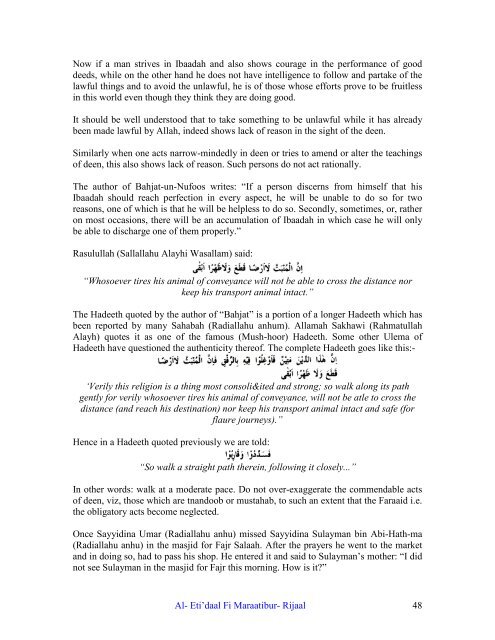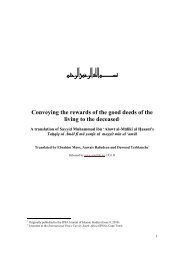al_etidaal_gn
al_etidaal_gn
al_etidaal_gn
Create successful ePaper yourself
Turn your PDF publications into a flip-book with our unique Google optimized e-Paper software.
Now if a man strives in Ibaadah and <strong>al</strong>so shows courage in the performance of good<br />
deeds, while on the other hand he does not have intelligence to follow and partake of the<br />
lawful things and to avoid the unlawful, he is of those whose efforts prove to be fruitless<br />
in this world even though they think they are doing good.<br />
It should be well understood that to take something to be unlawful while it has <strong>al</strong>ready<br />
been made lawful by Allah, indeed shows lack of reason in the sight of the deen.<br />
Similarly when one acts narrow-mindedly in deen or tries to amend or <strong>al</strong>ter the teachings<br />
of deen, this <strong>al</strong>so shows lack of reason. Such persons do not act ration<strong>al</strong>ly.<br />
The author of Bahjat-un-Nufoos writes: “If a person discerns from himself that his<br />
Ibaadah should reach perfection in every aspect, he will be unable to do so for two<br />
reasons, one of which is that he will be helpless to do so. Secondly, sometimes, or, rather<br />
on most occasions, there will be an accumulation of Ibaadah in which case he will only<br />
be able to discharge one of them properly.”<br />
Rasulullah (S<strong>al</strong>l<strong>al</strong>lahu Alayhi Was<strong>al</strong>lam) said:<br />
“Whosoever tires his anim<strong>al</strong> of conveyance will not be able to cross the distance nor<br />
keep his transport anim<strong>al</strong> intact.”<br />
The Hadeeth quoted by the author of “Bahjat” is a portion of a longer Hadeeth which has<br />
been reported by many Sahabah (Radi<strong>al</strong>lahu anhum). Allamah Sakhawi (Rahmatullah<br />
Alayh) quotes it as one of the famous (Mush-hoor) Hadeeth. Some other Ulema of<br />
Hadeeth have questioned the authenticity thereof. The complete Hadeeth goes like this:-<br />
‘Verily this religion is a thing most consoli&ited and strong; so w<strong>al</strong>k <strong>al</strong>ong its path<br />
gently for verily whosoever tires his anim<strong>al</strong> of conveyance, will not be atle to cross the<br />
distance (and reach his destination) nor keep his transport anim<strong>al</strong> intact and safe (for<br />
flaure journeys).”<br />
Hence in a Hadeeth quoted previously we are told:<br />
“So w<strong>al</strong>k a straight path therein, following it closely...”<br />
In other words: w<strong>al</strong>k at a moderate pace. Do not over-exaggerate the commendable acts<br />
of deen, viz, those which are tnandoob or mustahab, to such an extent that the Faraaid i.e.<br />
the obligatory acts become neglected.<br />
Once Sayyidina Umar (Radi<strong>al</strong>lahu anhu) missed Sayyidina Sulayman bin Abi-Hath-ma<br />
(Radi<strong>al</strong>lahu anhu) in the masjid for Fajr S<strong>al</strong>aah. After the prayers he went to the market<br />
and in doing so, had to pass his shop. He entered it and said to Sulayman’s mother: “I did<br />
not see Sulayman in the masjid for Fajr this morning. How is it?”<br />
Al- Eti’da<strong>al</strong> Fi Maraatibur- Rija<strong>al</strong> 48




